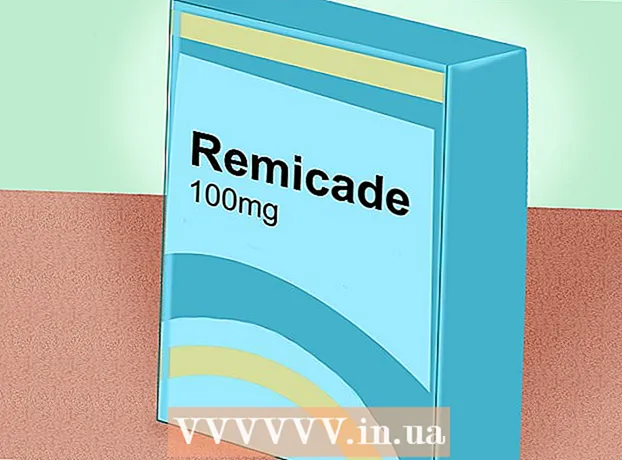Author:
Florence Bailey
Date Of Creation:
22 March 2021
Update Date:
1 July 2024

Content
- Steps
- Part 1 of 2: Protective Measures
- Part 2 of 2: Protecting Your Home from Mosquitoes
- Tips
- Warnings
- Similar articles
Mosquito bites can be a big nuisance for your baby. This is due not only to the fact that children often scratch their bites hard, and to the fact that mosquitoes are carriers of various diseases (especially in tropical countries), but also because the skin damaged by a bite and scratching increases the risk of various infections. There are many ways to keep your child safe from mosquito bites: repellents, closed clothing, and choosing places to play can all be helpful in protecting your little one.
Steps
Part 1 of 2: Protective Measures
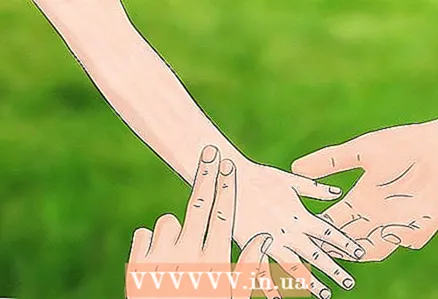 1 Apply a repellent (mosquito repellent). If your baby is two months to three years old, choose a repellent with diethyltoluamide (DEET). Be careful not to get the product on your baby's face or hands. Apply the product to your hands first and then rub it on your child, you can also try a cream-based repellent. Do not apply too much of the product. Apply repellents only to exposed skin. Do not under any circumstances use mosquito repellent under clothing. At the end of the day or night, wash off the remains of the product with warm water and soap.
1 Apply a repellent (mosquito repellent). If your baby is two months to three years old, choose a repellent with diethyltoluamide (DEET). Be careful not to get the product on your baby's face or hands. Apply the product to your hands first and then rub it on your child, you can also try a cream-based repellent. Do not apply too much of the product. Apply repellents only to exposed skin. Do not under any circumstances use mosquito repellent under clothing. At the end of the day or night, wash off the remains of the product with warm water and soap. - Mosquito repellent intended for children should not contain more than 30% diethyltoluamide.
- Do not use diethyltoluamide products on babies younger than two months old.
- Do not spray insect repellent on open wounds.
- Do not use lemon eucalyptus oil to protect children from mosquito bites.
- While it is important to use both sunscreen and mosquito repellent cream, do not use means combining both products. It is recommended that you avoid mosquito repellents that protect you from the sun. Instead, apply sunscreen, followed by repellent, as directed on the package.
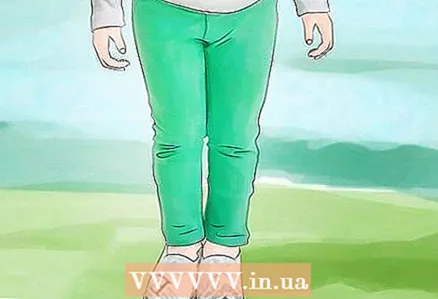 2 Dress your child. In summer, dress your child in light, light-colored clothing that covers most of the body: a light long-sleeved T-shirt and long pants work best. Also remember to wear socks and a wide-brimmed panama hat.Light cotton or linen clothes are best suited: they not only protect the baby from mosquito bites, but also protect from the sun.
2 Dress your child. In summer, dress your child in light, light-colored clothing that covers most of the body: a light long-sleeved T-shirt and long pants work best. Also remember to wear socks and a wide-brimmed panama hat.Light cotton or linen clothes are best suited: they not only protect the baby from mosquito bites, but also protect from the sun. - Do not dress your child too warmly, or they may overheat. On hot days, opt for breathable fabrics and single-layer clothing.
- Special clothing for sun protection and swimming can also be a good choice.
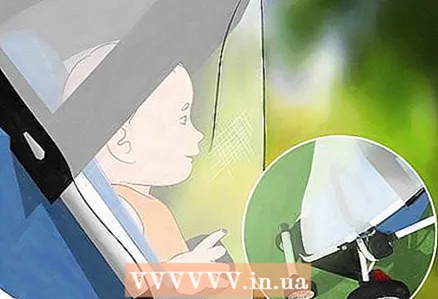 3 Use mosquito nets. If you are in a place where there are many mosquitoes, then use mosquito nets for the crib. If you are heading out in the evening or taking a walk in the woods where mosquitoes may be, pull a mosquito net over the stroller. Thanks to the mosquito net, the child will be able to breathe calmly and will be protected from mosquitoes.
3 Use mosquito nets. If you are in a place where there are many mosquitoes, then use mosquito nets for the crib. If you are heading out in the evening or taking a walk in the woods where mosquitoes may be, pull a mosquito net over the stroller. Thanks to the mosquito net, the child will be able to breathe calmly and will be protected from mosquitoes. 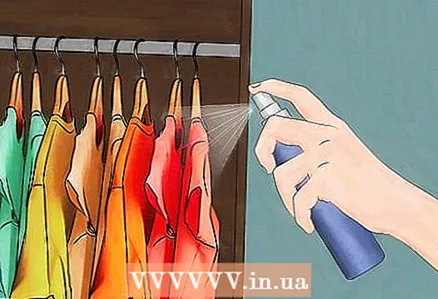 4 Apply peppermint repellent to your clothing. Use peppermint repellents - apply to clothing. In some stores, you can even find special clothes that have already been treated with such repellents.
4 Apply peppermint repellent to your clothing. Use peppermint repellents - apply to clothing. In some stores, you can even find special clothes that have already been treated with such repellents. - Do not apply peppermint repellent to your skin.
 5 Do not take your child outside in the evening or early morning if there are a lot of mosquitoes. Of course, mosquitoes can bite at any time, but they are especially active in the morning and evening. If the child is outside at this time, dress him appropriately and apply an appropriate repellent.
5 Do not take your child outside in the evening or early morning if there are a lot of mosquitoes. Of course, mosquitoes can bite at any time, but they are especially active in the morning and evening. If the child is outside at this time, dress him appropriately and apply an appropriate repellent.
Part 2 of 2: Protecting Your Home from Mosquitoes
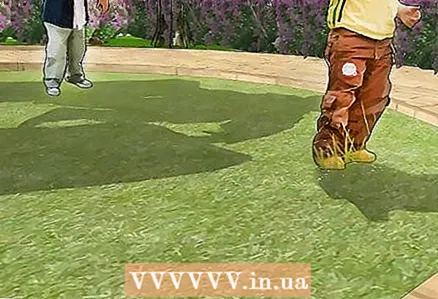 1 Set up a playground in dry areas of your yard. Try not to put a children's sandpit or children's pool next to a pond or in humid and shady places - find dry areas in your area. While it may seem like it is best to set up a shady corner to protect your child from the sun, try to do so in a location that is sunny and dry enough to keep out mosquitoes.
1 Set up a playground in dry areas of your yard. Try not to put a children's sandpit or children's pool next to a pond or in humid and shady places - find dry areas in your area. While it may seem like it is best to set up a shady corner to protect your child from the sun, try to do so in a location that is sunny and dry enough to keep out mosquitoes. - Limit the amount of time you play in the sun, especially after 10:00 am and until 4:00 pm if you are afraid of sun exposure.
- Do not allow children to play under any decks or platforms, as these are often damp and provide shelter for mosquitoes.
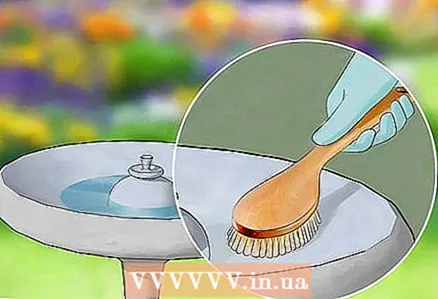 2 Change the standing water every week or more. Children's pools, ponds and bird drinkers - mosquitoes breed in such places with stagnant water. Change standing water regularly.
2 Change the standing water every week or more. Children's pools, ponds and bird drinkers - mosquitoes breed in such places with stagnant water. Change standing water regularly. - Do not leave old flower pots as they can collect water.
- If you do not use the paddling pool regularly, use the pool water, for example, to water the flowers. Try to make good use of the water, not just drain it.
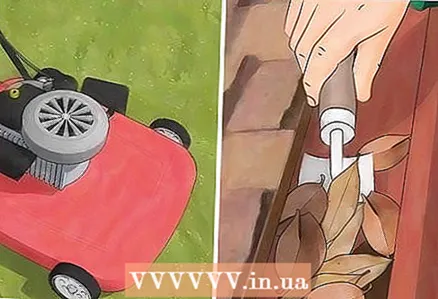 3 Monitor the condition of your yard. Trim your yard regularly, weed out any weeds, and remove any debris that has accumulated. If you have a pit fire, make sure there is no standing water in the pit. The same goes for any other objects where water can accumulate after rain - such places are a real paradise for mosquitoes. Try to equip your lawns so that there are no damp places where water can accumulate.
3 Monitor the condition of your yard. Trim your yard regularly, weed out any weeds, and remove any debris that has accumulated. If you have a pit fire, make sure there is no standing water in the pit. The same goes for any other objects where water can accumulate after rain - such places are a real paradise for mosquitoes. Try to equip your lawns so that there are no damp places where water can accumulate. - Trim your grass regularly.
- Cut or pull out tall weeds.
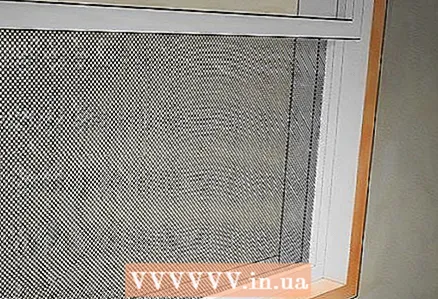 4 Close all possible mosquito entrances to your child's bedroom. Install, for example, mosquito nets on windows and block all possible mosquito routes. If a hole develops in the mesh, correct it immediately. Mosquitoes are able to penetrate even very small holes, especially at night when they try to find all possible ways to bite a person.
4 Close all possible mosquito entrances to your child's bedroom. Install, for example, mosquito nets on windows and block all possible mosquito routes. If a hole develops in the mesh, correct it immediately. Mosquitoes are able to penetrate even very small holes, especially at night when they try to find all possible ways to bite a person.
Tips
- Keep repellents (mosquito repellents) out of the reach of children.
Warnings
- Do not spray repellants in confined spaces.
- If your child has a rash allergy to the repellent, thoroughly wash the area to which you applied the product with soap and warm water. Call your doctor or go to the clinic. Call an ambulance if your child's allergic reaction is swelling (especially swelling of the face) or if the child has difficulty breathing.
Similar articles
- How to overcome selective mutism
- How to determine if a child has suffered psychological trauma
- How to protect children from secondhand smoke


